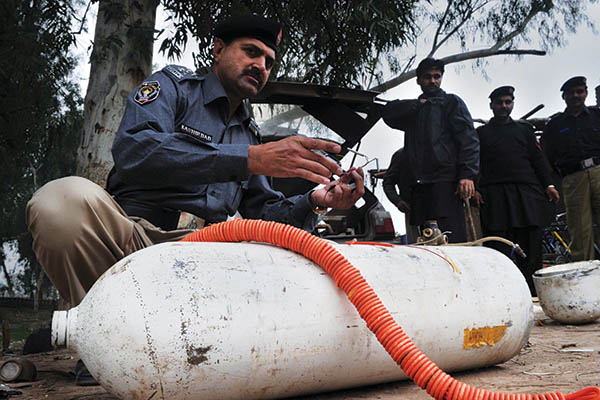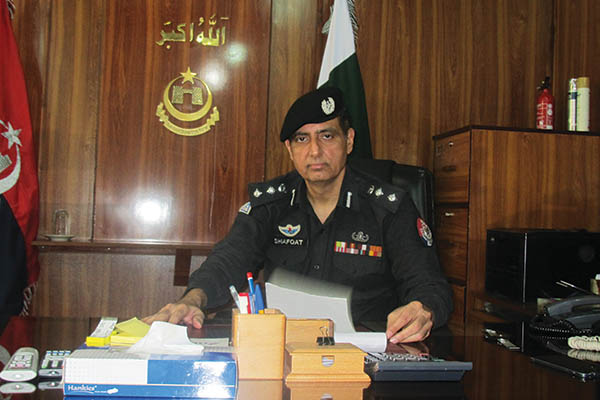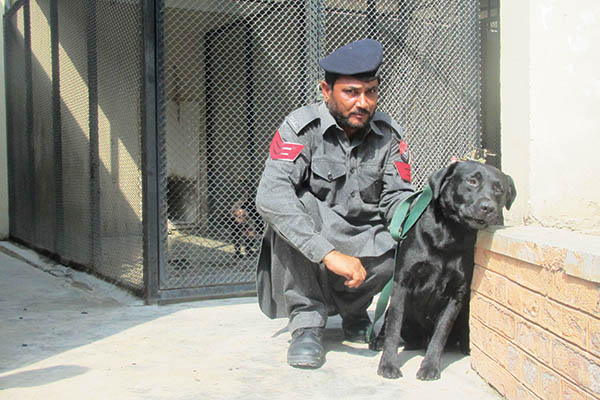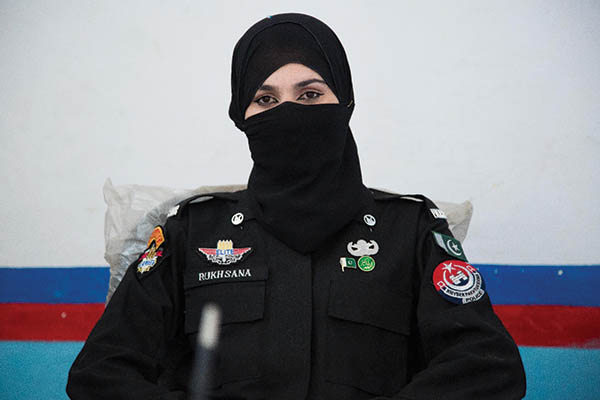
A bomb disposal squad official sits next to a defused explosive device found inside a car in Peshawar. A. Majeed—AFP
For Peshawar’s Bomb Disposal Unit, the war on militancy lives on
Less than a decade ago, the people of Khyber-Pakhtunkhwa had become numb to the near-daily occurrences of bombings that had left the region gripped in fear and turmoil. Following the Government of Pakistan’s decision to join the U.S.-led invasion of Afghanistan—and the rise of the Pakistani Taliban after the assault on Islamabad’s Lal Masjid in 2007—militancy was at its peak and provincial capital Peshawar often bore the brunt of the extremists’ ire. The situation persisted through 2014 when the tragic massacre of over 145 people, mostly students, at the Army Public School prompted military action, flushing militants out of the region and restoring a semblance of calm. Despite this reprieve, the danger to the men and women of the Khyber-Pakhtunkhwa Bomb Disposal Unit (BDU) has never lessened and they have continued to risk life and limb to ensure the safety of Pakistanis from attacks by Al Qaeda or the Taliban. For Shafqat Malik, the 53-year-old who currently heads the BDU, securing the lives of innocents is more than just a job—it is his lifelong mission.
“I have wanted to serve humanity since childhood,” he tells Newsweek, echoing similar claims by other members of his 550-strong force. The former military official, who joined the Pakistan Army in 1986 before going on to serve in its Ordnance Corps where he oversaw the ammunitions flowing through the country’s western frontier, is considered Pakistan’s foremost ‘forensics expert’—with good reason. In addition to his work with the Ordnance Corps, Malik has undertaken several advanced courses in forensics and investigation at Quantico, Scotland Yard and with the Australian Federal Police that have honed his skills and made him an invaluable resource for Pakistan.
It is a testament to his skills that he was picked to assist the U.N. and Scotland Yard teams investigating Benazir Bhutto’s killing. “Both teams, U.N. and Scotland Yard, couldn’t add any evidence to the investigation conducted by me,” he says proudly, noting that they took weeks to arrive upon a conclusion that “took me 30 minutes with my naked eye.” There are reams of evidence in any bombing case if you know what to look for, he says. “Cartridges, pistols, DNA, head of the bomber, all are our evidences,” he says.
“There was a misconception in Pakistan that suicide bombers do not leave any traces for investigation,” says Malik. “I proved it wrong. We can recover each and everything of the bomber.” His attention to detail has also helped answer questions that had long plagued security forces in Pakistan as in 2007 when the country faced a slew of major bombing incidents. “I picked up a trigger at Marriott Hotel (the first major bombing of the year) and decided to investigate its origins. Luckily, I found similar triggers after attacks on politician Aftab Sherpao in Charsadda and a Muharram procession in Dera Ismail Khan,” he added. Through comparative analysis, Malik found similarities in factory code, lot number and initiating system of all the triggers. “I concluded that one group was involved in all these terror activities,” he says, noting that one tiny trigger had answered a major question. “This was a new beginning,” he adds.
Unlike the rest of the world, Pakistan lacks the resources for dedicated departments for bomb defusing, evidence collection and forensics investigation. Here, the BDU has, by necessity, become the de facto place for the breadth of work required after any major terror attack. Malik, as its head, is the man of the hour. “I am a sort of moving explosive forensics laboratory,” he says jokingly, adding that his training and experience have been invaluable. But this journey—from military official to forensics expert—has not come without personal cost.

Shafqat Malik, the head of the Khyber-Pakhtunkhwa Bomb Disposal Unit. Photograph by Nazar ul Islam
Lifelong mission
Malik joined the Khyber-Pakhtunkhwa BDU in 2009, voluntarily abandoning a lucrative position with the Federal Investigation Agency in capital Islamabad. In the nine years since, he says, his team has defused over 7,000 improvised explosive devices and bombs, saving more than 60,000 lives and preventing the loss of billions in damages to property and livelihoods. Much of this can be attributed to his leadership. Established in the 1980s to combat the rise of militant attacks in Peshawar, the BDU long struggled with lack of manpower and expertise in one of the most dangerous areas of the country. Malik changed all that. He raised the strength of the BDU from 35 to 550 personnel and expanded its operations from Peshawar to all districts of Khyber-Pakhtunkhwa province. In addition, under Malik’s supervision, the BDU upgraded its tools, replacing ply cutters with bomb-defusing robots.
All this, notes Malik, has been done through donations and at no cost to the exchequer. “Not a single penny is contributed by the government,” he says, adding that the U.S., the U.K. and European Union provided them with signal jammers, body armor, robots and advanced vehicles. He also helmed the induction of women into the BDU and incorporated a K9 unit—essential components that had once been dismissed as unworkable within Pashtun culture.
But while his work has been instrumental in combating the rise of extremism in Pakistan, it has taken a toll on his personal life. “My family life is over, finished,” he says ruefully, noting that he has been unable to spend any substantial time with his wife or two children in 10 years. “I was unable to give them the time I should have; I feel sorry about that,” he says.
Malik’s wife, 50-year-old Humaira, is perhaps unsurprisingly the biggest critic of the high-risk job. “The moment he leaves home, I feel terror at levels I cannot even explain,” she tells Newsweek, adding that he often tries to downplay threats to his life in their daily communication which only raises her anxiety levels.
Recalling one such incident, she says he had told her that he had just reached the office. “When I switched on the television, I saw he was trying to diffuse a suicide bomber,” she says. Malik admits he often tries to shield his wife from some of the more troubling aspects of his job. Narrating one particularly harrowing incident, he says he and his wife had stopped in Swabi to offer funeral prayers for two martyrs. “I got out of the car and found myself standing right on top of an IED. It was a pressure cooker IED, a signature mark of Al Qaeda. My wife was still in the car as I stood on top of it. Had that gone off, my wife would have seen me blown into pieces.”
Humaira says she often argues with her husband about the threats to his life and the lack of normalcy in their everyday existence. “But he always tells me this is his passion.” This is slim comfort, she admits. “As a family, we have asked him to leave this job on several occasions. But he always tells us that this is the only way he can be happy,” she says, adding that their children are also constantly under stress and have no real recreation in their lives.
Malik, however, says that his work helps contribute, directly or indirectly, toward achieving global peace—and his personal life is a small price for that lofty goal. “I am not doing this solely for the people of my own country, but for the whole world. I wish peace in the world. I believe we are dealing with terrorists and they have no boundaries. These men aren’t all from the tribal agencies or Khyber-Pakhtunkhwa; they are international terrorists. This is an international war. [By fighting them] we are contributing toward peace in the world,” he added.
Morale boost
Malik may be the face—and muscle—behind the BDU, but he is quick to acknowledge that he would be nothing without his team. “To be an IED technician, you have to be mad,” he says, “to know that there is a 50/50 chance of survival every time you go out and still keep doing it day after day. If that is not madness, then what is?”
The BDU chief admits that low morale is the biggest hurdle for his staff—the unit has lost around a dozen technicians to bombings in recent years and has never been recognized for its work or rewarded by any global organization. “In 2013 the Nobel Peace Prize was awarded to the organization that destroys Syrian chemical weapons—the Organization for the Prohibition of Chemical Weapons—and that was demoralizing to some of our men who felt the world did not care about their work,” he says, adding that several had left Pakistan and settled abroad. “I, too, was offered a lucrative position abroad, but this country needs me more and smiling faces of our local countrymen are better than financial incentives,” he says.
“We have defused thousands of bombs but have done so in a way that does not create panic, that does not make our citizenry feel like they are at war. We have not broken the myth of peace despite fighting a decades-long war,” he says, noting that the work done by the BDU is no less than that being done in war-torn states such as Syria, Iraq, Afghanistan. “It is one of the best units in the world,” he says with pride, noting that it has prevented thousands of attacks people may not even know about, including an attempt to destroy the Kohat Tunnel with a vehicle carrying over 4,000kg of explosives.
Even if the local populace often forgets about the work being done by the BDU, militants do not and often target members of the unit in retaliation for foiled plots. In 2012, their attack netted one of the BDU’s best: Hukam Khan. The 51-year-old pioneer of the BDU had been with the unit since the 1980s. That fateful September day, he was traveling home when he received word of an IED. Instead of completing his journey, he decided to take a detour and defuse the bomb first. “He had to defuse four bombs,” says Malik. “He had finished defusing one when the militants opened fire on his position and he died in a secondary explosion.” This was a horrible time for his unit, admits Malik. “I knew I had to reach the site immediately. A very important person of my team had been targeted. Our morale was low. I decided I had to lead from the front to show my unit none of them were alone. I also wanted to send a message to the terrorists that this war would not stop if they killed one of us—no matter how important.”
Malik says the militants sent them messages laughing at having eliminated Khan. “I told my men right then that we had to completely clear this area of all bombs before Khan’s funeral prayers to send a message. There were three more IEDs and the militants continued intermittent firing throughout. We did not falter. We defused the bombs and then detonated them [at a distance] to ensure the militants knew we had found them. It was a very emotional moment. My men and I were crying over the death of Hukam Khan. But we sent the necessary message: we are not going to lose this battle,” said Malik.

One of the K9 units inducted into the Bomb Disposal Unit by Shafqat Malik. Photograph by Nazar ul Islam
Localized expansion
The battle between the forces of extremism and Pakistan’s beleaguered security forces shows no signs of ending despite significant military gains in recent years. BDU officials are often required to defuse bombs on their first day on the job and their training cannot be lax. To ensure there is no security gap, Malik has led the charge to expand the BDU’s strength, including the induction of women.
“We shouldn’t be gender-biased,” he says to critics who claim it is not “proper” for women to serve on the frontlines. “Women can search other women better and, in case of any untoward incident, a BDU official is better trained to handle the situation confidently than a lady constable who could panic.”
Rukhsana Bibi joined the police in 2011 before expressing an interest in joining the BDU two years ago. “It’s a risky job. But one day we all have to die. Rescuing others should be more important than caring about our own life,” she tells Newsweek, adding it had been difficult to convince her family to allow her to serve the country in this capacity. “It is the most dangerous job on earth. One single error could end your life in seconds,” she says, adding that seeing the relief on the faces of people they had saved was worth the threat.
But humans aren’t the only ones serving on the frontlines. After visiting Scotland Yard in 2009, Malik sought a Canine Unit staffed with explosive sniffing dogs for Peshawar. “I was shocked when they told me that this was not sustainable because Pashtuns don’t like dogs,” he says. “I told them this is totally wrong perception.” The K9 unit, launched with two dogs in 2010 but now numbering more than 50, aims at a proactive approach. “It is part of our offensive strategy,” says Malik. “They allow us to track bombs before they have been planted,” he adds, noting that K9 units now serve in most sensitive areas with “satisfactory” results.
Munawar Shah, a former military officer who heads Peshawar’s K9 unit, said they had 64 dogs in total. “All are trained to sniff out explosives,” he told Newsweek. In addition to BDU operations, these dogs are also used for VVIP visits, and help secure buildings and routes. “We have Labradors and German Shepherds, which are both highly effective breeds and hardly miss any explosives, regardless of quantity.”

Rukhsana Bibi, one of the women inducted into the BDU. Photo courtesy Rukhsana Bibi
Emotional toll
The worst part of a BDU employee’s work is coping with personal trauma. These men and women are required to not only defuse bombs, but also be on the lookout for secondary devices while gathering evidence about the perpetrators. “There is significant emotional fallout,” says Malik. “We have to conduct our work amid the remnants of bodies, injured and dying. Just imagine how much pressure you would be under in similar circumstances!”
Initially, says the BDU chief, he found it difficult to sleep after completing his work. “I would close my eyes and see the bomber’s head and his eyes looking at me,” he says. “But eventually this passed. A time came when I would actually be pleased to see a disembodied head because it could offer a clue about who was responsible for the blast,” he added.
The BDU’s work is especially dangerous because they are often called in to deal with explosives planted in densely populated areas. “We have to defuse it in that case—an explosion, even without injuries, would meet the motives of the terrorists,” he says, referring to the goal of stoking fear in the common man. Having personally participated in hundreds of bomb disposal cases, Malik has come close to death more times than he can count and has developed an almost nihilistic approach to his job. “I believe bombs are not going to kill me. I have developed friendship with bombs. But there are so many other elements!”
Those elements, such as targeted attacks and suicide bombings, often target the BDU at disproportionate levels—with little government support. “We face the brunt. People might disagree but in my view, terrorist acts in Islamabad and Punjab have reduced considerably through our efforts. BDU staffers are deployed at checkposts on major travel routes and prevent terrorist movements. Islamabad and Punjab get the dividends of these efforts,” he added. “We know we have prevented the detonation of over 7,000 bombs. Just imagine that we had not been around to deal with those; what would be the state of Pakistan today?”
From our Nov. 3 – 10, 2018 issue

1 comment
Salute to your bravery sir. God bless!